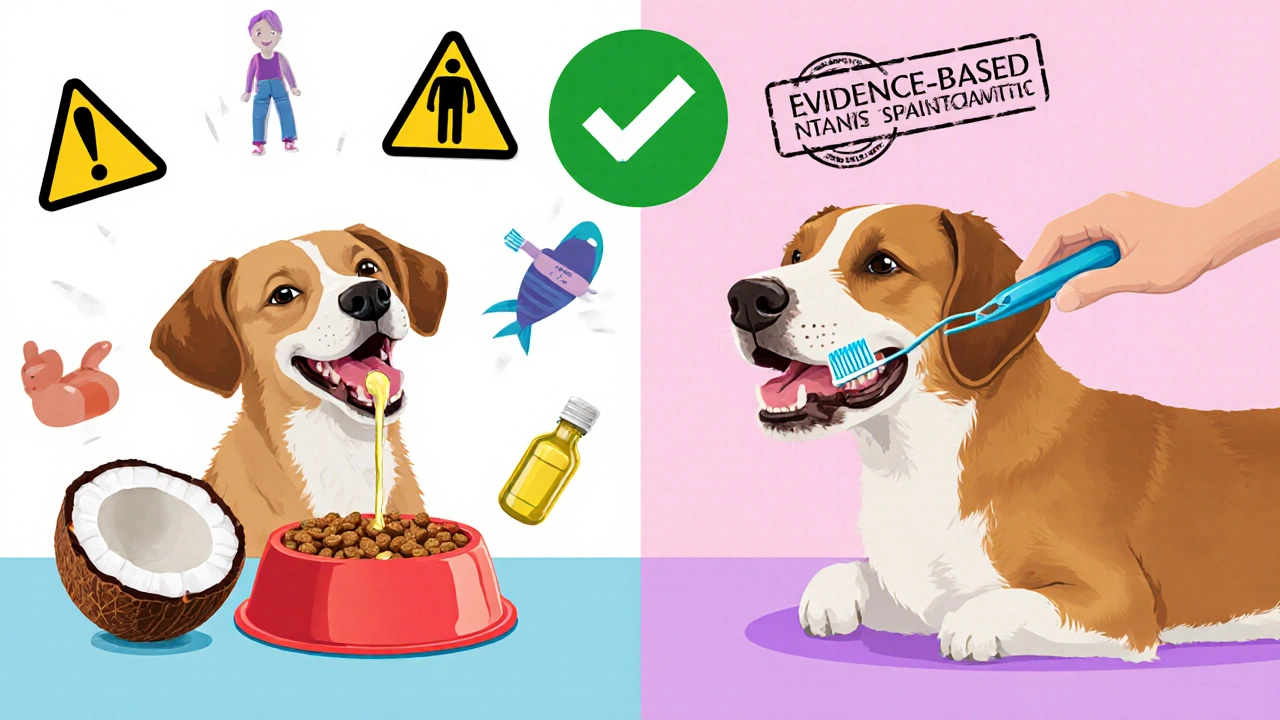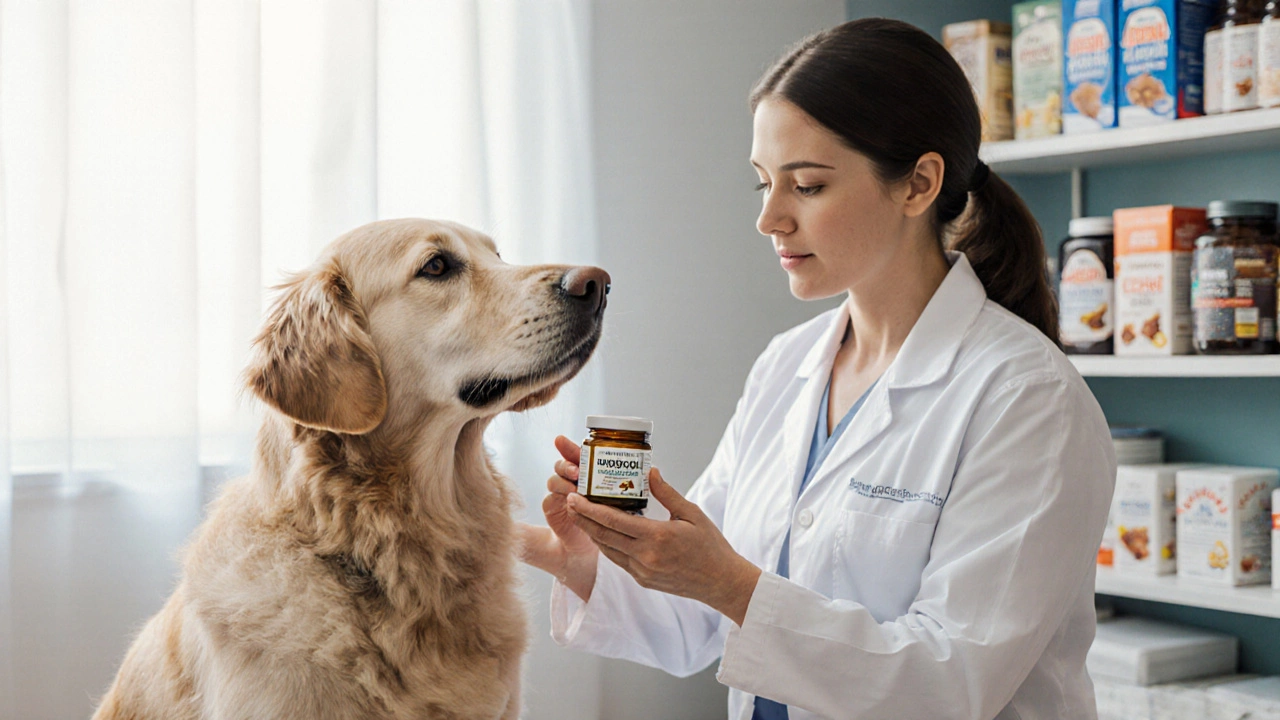Coconut Oil Dosage Calculator
Veterinary Dosage Guidelines
Only 18% of veterinarians recommend coconut oil for dogs. Safe dosage is 1/4 teaspoon per 10 pounds of body weight. Never exceed 1 teaspoon per 10 pounds. High risk for pancreatitis in breeds like Miniature Schnauzers, Cocker Spaniels, and Shetland Sheepdogs
- History of pancreatitis
- Weight issues
- Skin infections
Veterinary Alternatives
For skin/coat issues: Omega-3 fatty acids from fish oil (vet-approved).
For bad breath: Dental chews with VOHC approval.
For weight management: Reduce treats and increase walks.
Coconut oil has become a popular buzzword in dog care circles. You’ve probably seen it on social media, in pet stores, or from well-meaning friends who swear it’s a miracle cure for itchy skin, bad breath, or dull coats. But here’s the real question: do vets recommend coconut oil for dogs? The answer isn’t a simple yes or no - it’s more complicated, and it matters because your dog’s health depends on it.
What’s Actually in Coconut Oil?
Coconut oil is mostly fat - about 90% saturated fat. That sounds scary if you’re used to hearing that saturated fats are bad, but not all saturated fats are the same. The main type in coconut oil is lauric acid, which makes up about 50% of its composition. Lauric acid has antimicrobial properties and is also found in human breast milk. That’s why some people think it’s safe - and even beneficial - for dogs.
There are two types of coconut oil you’ll see: refined and unrefined (also called virgin or cold-pressed). Unrefined coconut oil keeps more of its natural compounds and has a stronger coconut smell. Refined is processed with heat and chemicals, which strips out some nutrients. For dogs, unrefined is the better choice if you’re going to use it at all.
What Do Vets Actually Say?
A 2023 survey of 215 board-certified veterinary nutritionists showed that only 18% routinely recommend coconut oil for dogs. The majority - 76% - said they either discourage it or only consider it in very specific cases. Why? Because the evidence is weak.
There are no large-scale, peer-reviewed studies proving coconut oil improves dog health in a meaningful way. Most of the claims come from anecdotal reports or small, poorly controlled experiments. For example, some dog owners say their pet’s coat became shinier after adding coconut oil to food. But shiny coats can also come from better overall nutrition, regular brushing, or even seasonal changes. Correlation isn’t causation.
One small 2020 study from the University of Illinois looked at 20 dogs fed coconut oil daily for six weeks. Researchers found a slight reduction in skin inflammation markers - but no improvement in coat quality or odor. The dogs didn’t lose weight, gain energy, or show better digestion. The changes were minor and not clinically significant.
Common Claims vs. Reality
Let’s break down the most popular reasons people give coconut oil to their dogs - and what science says about each.
- Improves skin and coat: Some dogs with dry, flaky skin may see temporary relief from topical application. But if the dryness is caused by allergies, hypothyroidism, or parasites, coconut oil won’t fix the root problem. In fact, applying oil to already inflamed skin can trap bacteria and make infections worse.
- Helps with digestion: There’s zero solid evidence coconut oil aids digestion in dogs. Some dogs get diarrhea or vomiting when given too much, because their pancreas can’t handle the extra fat.
- Boosts energy: Coconut oil is pure fat - 120 calories per tablespoon. That’s more than a whole cup of kibble for small dogs. Adding it to food can lead to weight gain, not energy boosts.
- Fights bad breath: Bad breath usually comes from dental disease, not gut issues. Coconut oil won’t clean tartar or treat gum infections. Brushing teeth or professional dental cleanings will.
- Repels fleas: Coconut oil has no proven flea-repelling properties. It might make your dog smell like a piña colada, but fleas don’t care.

When Might a Vet Allow It?
There are rare cases where a vet might say it’s okay - but only under strict conditions.
If your dog has a chronic skin condition like atopic dermatitis and has tried everything else - prescription diets, antihistamines, allergy shots - a vet might suggest a tiny amount of coconut oil (1/4 teaspoon per 10 pounds of body weight) as a last-resort supplement. Even then, it’s not a treatment. It’s a supportive measure, and only if your dog’s weight and pancreas are healthy.
Some holistic vets use it for dogs with seizure disorders, based on the ketogenic diet theory (high fat, low carb). But that’s a medical protocol, not a DIY kitchen remedy. It requires blood monitoring, precise ratios, and constant vet oversight.
The Real Risks
Coconut oil isn’t toxic to dogs - but that doesn’t mean it’s safe. Here’s what can go wrong:
- Pancreatitis: High-fat foods are the #1 trigger for pancreatitis in dogs. Breeds like Miniature Schnauzers, Cocker Spaniels, and Shetland Sheepdogs are especially at risk. One tablespoon of coconut oil can be enough to trigger an attack in a sensitive dog.
- Weight gain: Dogs don’t burn fat the same way humans do. Extra calories from oil turn into extra pounds fast. Even a teaspoon a day adds up to 365 extra calories a year - that’s about 1.5 pounds of body weight.
- Diarrhea and vomiting: Many dogs can’t handle large amounts of fat. If your dog gets loose stools after eating coconut oil, stop immediately.
- Interference with medications: Coconut oil can affect how some drugs are absorbed, especially thyroid meds and cholesterol-lowering drugs.

What Should You Do Instead?
If your dog has a skin issue, bad breath, or dull coat, there are proven, vet-approved solutions:
- For dry skin: Omega-3 fatty acids from fish oil (like salmon oil) have strong evidence backing their use. They reduce inflammation and improve skin barrier function.
- For bad breath: Brush your dog’s teeth daily with dog-safe toothpaste. Dental chews with VOHC approval (Veterinary Oral Health Council) work too.
- For dull coat: Make sure your dog’s food has high-quality animal protein and essential fatty acids. Many premium dog foods already include these.
- For weight management: Cut back on treats. Increase walks. Talk to your vet about a weight-loss diet formulated for dogs.
These solutions have clinical trials, vet approval, and real results. Coconut oil doesn’t.
Bottom Line
Most vets don’t recommend coconut oil for dogs - not because they’re against natural remedies, but because there’s no proof it helps, and plenty of proof it can hurt. It’s not a miracle cure. It’s just fat.
If you’re tempted to try it, talk to your vet first. Tell them why you want to use it. They can help you figure out if your dog’s real issue is something else - and what actually works.
Don’t let TikTok trends replace professional advice. Your dog’s health isn’t a viral challenge. It’s a responsibility.
Can coconut oil kill fleas on dogs?
No, coconut oil does not kill or repel fleas. It has no insecticidal properties. Fleas are unaffected by the smell or texture of coconut oil. For effective flea control, use vet-approved topical treatments like selamectin or oral medications like nitenpyram. These have been tested and proven to kill fleas within hours.
How much coconut oil can I give my dog?
If your vet approves it, start with 1/4 teaspoon per 10 pounds of body weight once a day. Never exceed 1 teaspoon per 10 pounds. Introduce it slowly over a week to avoid digestive upset. Most dogs don’t need it at all - and many will have side effects. Always check with your vet before giving any supplement.
Is coconut oil better than fish oil for dogs?
No. Fish oil contains EPA and DHA - omega-3 fatty acids proven to reduce inflammation, improve skin health, and support joint and brain function in dogs. Coconut oil is mostly saturated fat with no proven benefits for these areas. If you want to improve your dog’s coat or reduce itching, fish oil is the clear, vet-backed choice.
Can I put coconut oil on my dog’s paws?
You can, but it’s usually unnecessary. Coconut oil may soften dry paw pads temporarily, but it doesn’t treat underlying causes like allergies or environmental damage. More importantly, dogs will lick it off, which means they’re ingesting fat they don’t need. For cracked paws, use a vet-recommended paw balm made specifically for dogs - it’s safer and more effective.
What happens if my dog eats too much coconut oil?
Too much coconut oil can cause diarrhea, vomiting, greasy stools, and pancreatitis - a painful and potentially life-threatening inflammation of the pancreas. Signs include loss of appetite, lethargy, abdominal pain, and vomiting. If your dog eats a large amount (like half a cup or more), contact your vet immediately. Even smaller excesses can trigger issues in sensitive breeds.
